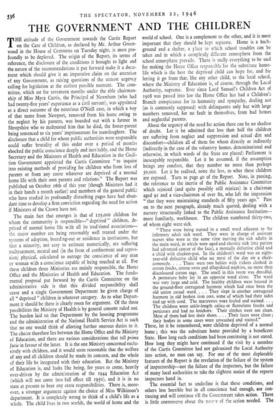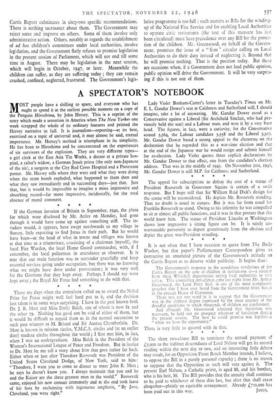THE GOVERNMENT AND THE CHILDREN
THE attitude of the Government towards the Curtis Report on the Care of Children, as declared by Mr. Arthur Green- wood in the House of Commons on Tuesday night, is most pro- foundly to be deplored. The origin of the Report, its terms of reference, the disclosure of the conditions it brought to light and the nature of the recommendations it put forward make it a docu- ment which should give it an imperative claim on the attention of any Government, as raising questions of the utmost urgency calling for legislation at the earliest possible moment. The com- mittee, which sat for seventeen months under the able chairman- ship of Miss Myra Curtis, the Principal of Newnham (who had had twenty-five years' experience as a civil servant), was appointed as a direct outcome of the notorious O'Neill case, in which a boy of that name from Newport, removed from his home owing to the neglect by his parents, was boarded out with a farmer in Shropshire who so maltreated him that he died, the foster-parent being sentenced to six years' imprisonment for manslaughter. The disclosure that a child for whom public authorities were responsible could suffer brutality of this order over a period of months shocked the public conscience deeply and inevitably, and the Home Secretary and the Ministers of Health and Education in the Coali- tion Government appointed the Curtis Committee " to inquire into existing methods of providing for children who from loss of parents or from any cause whatever are deprived of a normal home life with their own parents and relations." The Report was published on October 56th of this year (though Ministers had it in their hands a month earlier) and members of the general public. who have studied its profoundly disturbing pages have had abun- dant time to develop a firm conviction regarding the need for action if Ministers of the Crown have not.
The main fact that emerges is that of 125,000 children for whom the community is responsible—" deprived " children, de- prived of normal home life with all its traditional associations— the major number are being reasonably well treated under the systems of adoption, boarding-out or residence in institutions, but that a minority, not easy to estimate numerically, are suffering maltreatment, mental and (in the form of confinement and repres- sion) physical, calculated to outrage the conscience of any man or woman with a conscience capable of being touched at all. For these children three Ministries are mainly responsible, the Home Office and the Ministries of Health and Education. The funda- mental proposal put forward by the Curtis Committee on the administrative side is that this divided responsibility shall cease and a single Government Department be given charge of all " deprived " children in whatever category. As to what Depart- ment it should be there is clearly room for argument. Of the three possibilities the Ministry of Health is by general consent ruled out. The burden laid on that Department by the housing programme and the administration of the National Health Service Act is such that no one would think of allotting further onerous duties to it. The choice therefore lies between the Home Office and the Ministry of Education, and there are various considerations that tell prima facie in favour of the latter. It is the one Ministry concerned exclu- sively with children, and it would seem reasonable that the welfare of any and all children should be made its concern, and the whole of their life be integrated with their education. But the Ministry of Education is, and looks like being, for years to come, heavily over-driven by the administration of the 1944 Education Act (which will not come into full effect till 195o), and it is in no state at present to bear any extra responsibilities. There is, more- over, a stronger argument against the choice of Miss Wilkinson's department. It is completely wrong to think of a child's life as a whole. The child lives in two worlds, the world of home and the world of school. One is a complement to the other, and it is most important that they should be kept separate. Home is a back- ground and a shelter, a place to which school troubles can be taken and in which a completely different atmosphere from the school atmosphere prevails. There is really everything to be said for making the Home Office responsible for the substitute home- life which is the best the deprived child can hope for, and for letting it go from that, like any other child, to the local school, where the Ministry of Education is, of course, through the Local Authority, supreme. Ever since Lord Samuel's Children Act of 5908 was passed into law the Home Office has had a Children's Branch conspicuous for its humanity and sympathy, dealing not (as is commonly supposed) with delinquents only but with large numbers removed, for no fault in themselves, from bad homes and neglectful parents.
About the urgency of the need for action there can be no shadow of doubt. Let it be admitted that less than half the children are suffering from neglect and suppression and actual dirt and discomfort—children all of them for whom directly or indirectly (indirectly in the case of the voluntary homes, denominational and otherwise, in which wards of the State are placed) Parliament is inescapably responsible. Let it be assumed, if the assumption brings any comfort, that they number no more than perhaps 50,000. Let it be realised, none the less, to what these children are exposed. Turn to page 4o of the Report. Note, in passing, the reference to the inertia of the Public Assistance Committee which rejoiced (and quite possibly still rejoices) in a chairman aged 91 and a vice-chairman of over 8o, who left the impression " that they were maintaining standards of fifty years ago." Pass on to the next paragraph, already much quoted, dealing with a nursery structurally linked to the Public Assistance Institution-- more familiarly, workhouse. The children numbered thirty-two, of whom eight were sick.
" These were being nursed in a small ward adjacent to the infirmary adult sick ward. They were in charge of assistant nurses who were at the same time nursing the sick adults in the main ward, in which were aged and chronic sick (one patient had advanced cancer of the face), a mentally defective child and a child with chicken-pox. In the children's ward was an eight- year-old defective child who sat most of the day on a chair- commode. . . . There were two babies with rickets clothed in cotton frocks, cotton vests and dilapidated napkins, no more rhan discoloured cotton rags. The smell in this room was dreadful. A premature baby lay in an opposite ward alone. The ward was very large and cold. The healthy children were housed in the ground-floor corrugated hutment which had once been the old union casual ward. . . . They slept in another corrugated hutment in old broken iron cots, some of which had their sides tied up with cord. The mattresses were fouled and stained. . . . The Children wore ankle-length calico or flannelette frocks and petticoats and had no knickers. Their clothes were not clean.
Most of them had lost their shoes. . Their faces were clean ; their bodies in some cases were unwashed and stained." These, let it be remembered, were children deprived of a normal home ; this was the substitute home provided by a beneficent State. How long such conditions had been continuing is not stated. How long they might have continued if the visit by a member of the Curtis Committee had not galvanised the Local Authority into action, no man can say. For one of the most deplorable features of the Report is the revelation of the failure of the system of inspectorship—not the failure of the inspectors, but the failure of many local authorities to take the slightest notice of the reports inspectors hand in.
The essential fact to underline is that these conditions, and others less horrible but in all conscience bad enough, are con- tinuing and will continue till the Government takes action. There is little controversy about the nature of the action needed. The Curtis Report culminates in sixty-two specific recommendations. There is nothing sacrosanct about them. The Government may reject some and improve on others. Some of them involve only administrative action. Others, notably as regards the establishment of ad hoc children's committees under local authorities, involve legislation, and the Government flatly refuses to promise legislation in •the present session of Parliament, which will not end till some time in August. There may be legislation in the next session, which will begin in October, 1947, or later. Meanwhile the children can suffer, as they are suffering today ; they can remain crushed, confined, neglected, frustrated. The Government's legis- lative programme is too full ; such matters as 13:11s for the winding. up of the National Fire Service and for enabling Local Authorities to operate civic restaurants (the text of this measure has just been circulated) must have precedence over any Bill for the protec- tion of the children. Mr. Greenwood, on behalf of the Govern. ment, promises the issue of a " firm " circular calling on Local Authorities to do their duty instead of neglecting it. Beyond that he will promise nothing. That is the position today. But there are occasions when, if a Government does not lead public opinion, public opinion will drive the Government. It will be very surpris- ing if this is not one of them.



































 Previous page
Previous page